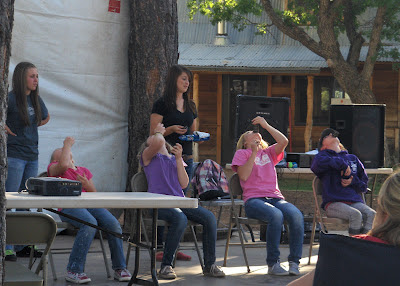13 May 2012: Nine of our ten chickens outside the hen house.
I've written several posts about our garden this year, but some of you may be wondering about our chickens, who got so much blog-space last year. Of the 12 we started out with (10 hens and 2 roosters), we still have 10 (9 hens and 1 rooster), and they are all doing well.
Those who have followed this blog know that we butchered one of the roosters, Gonzo, last fall because the more aggressive rooster, Percy, had no intention of sharing his females with the young upstart.
28 May 2012: Percy's feathers get ruffled when he feels threatened.
Percy continues to jealously guard his hens against all comers, including huge neighborhood dogs. He instantly ushers the females into the hen house and then he's prepared to defend them to the death. He even challenges us when we enter the coop or stand too close to the fence to feed them cracked corn and kitchen scraps. Watch your toes!
Several neighbors also have chickens, and they assure us that Percy is one of the most aggressive roosters they've ever seen.
26 May 2012: Eggs boiling for potato salad.
The remaining 9 hens continue to provide us with lovely brown and blue-green eggs, about 4 dozen per week. We have a sign in the driveway near the road advertising the extras for sale. We only sell about 5-6 dozen most months, but it helps.
You may have noticed that we are short one chicken (besides Gonzo). One winter day, Ed suddenly noticed that one hen was gone. One of his favorites, Kate (whose coloring resembled that of a pheasant), simply disappeared. There were no holes she could have escaped through. There were no feathers or blood to indicate a predator had gotten her. We searched the neighborhood for days, but we never saw her again.
Ed wonders if she slipped past him when he opened the hen house door after dark one evening, but if that were the case we should have soon found her (or her blood and feathers), because the hens never stray far from the safety of their coop. When they get out, they soon become nervous and head for home if they feel threatened.
As for me, I wondered if a human came and took her. The hen house is not locked. I guess we'll never know.
20 June 2012: Incubating eggs.
Meanwhile, we are working on the next generation. Ed bought a small incubator that holds just 7 eggs and he is attempting to hatch our first set of chicks. The gestation period is only 21 days, and this batch is due to hatch around July 3rd. We have no idea how many chicks we will get on this first try, if any.
We won't even be home to find out. We are leaving very early on Monday (July 2) for a 3-week road trip to New York, so a neighbor boy, Leevi, will be caring for our house, garden, and animals. In fact, these chicks are going to be his.
Leevi's family keeps their own chickens, but they have none that lay blue eggs, so Ed promised to hatch a batch of Easter Egger chicks for Leevi. Leevi will be here for his chicks' hatchings, and we will hatch our own batch when we get home at the end of July.















,+counselor+at+LDS+Youth+Conf,+Camp+Osceola,+Barton+Flats,+CA.jpg)

































